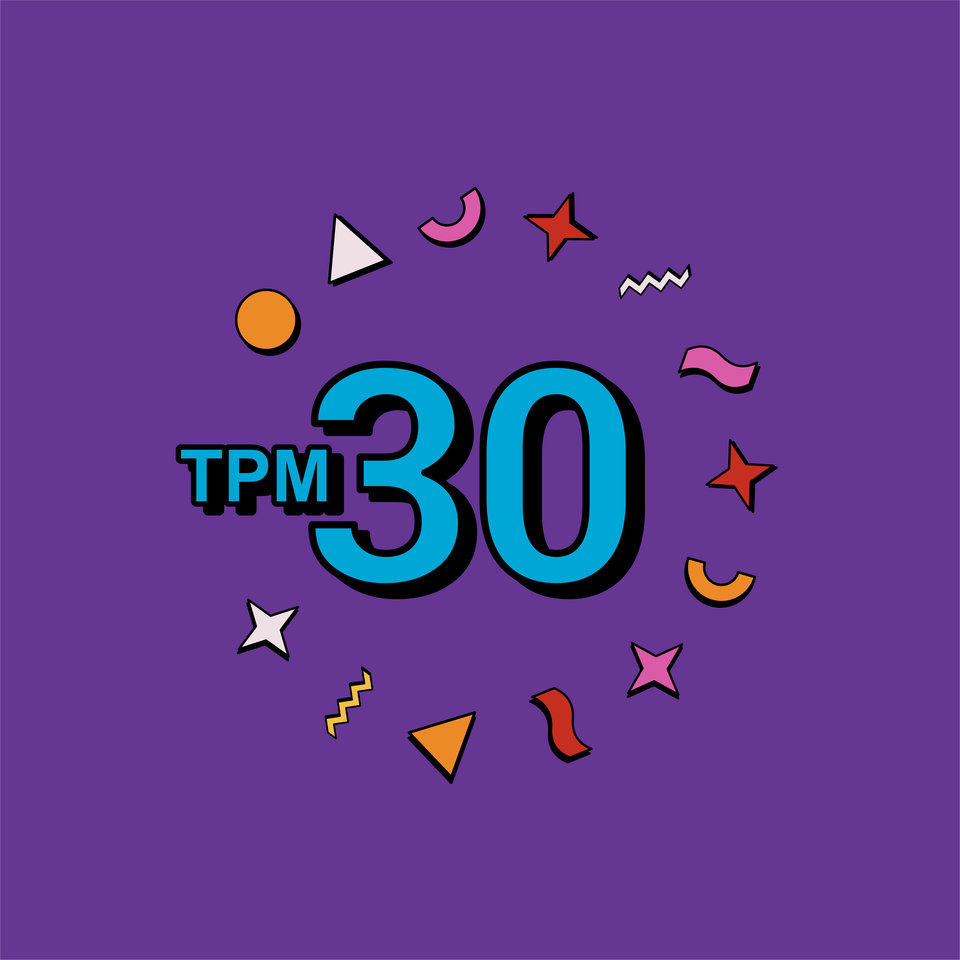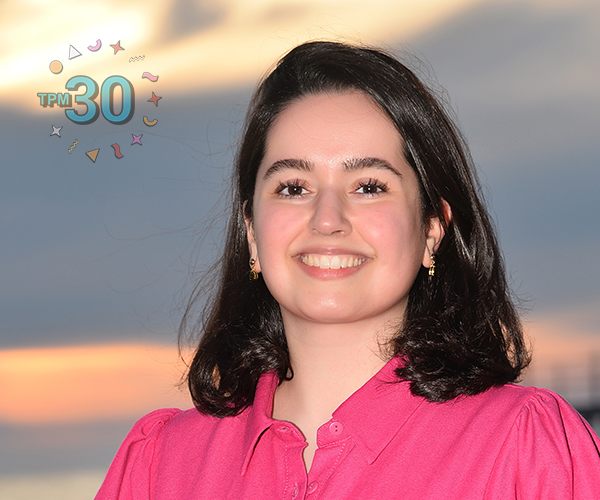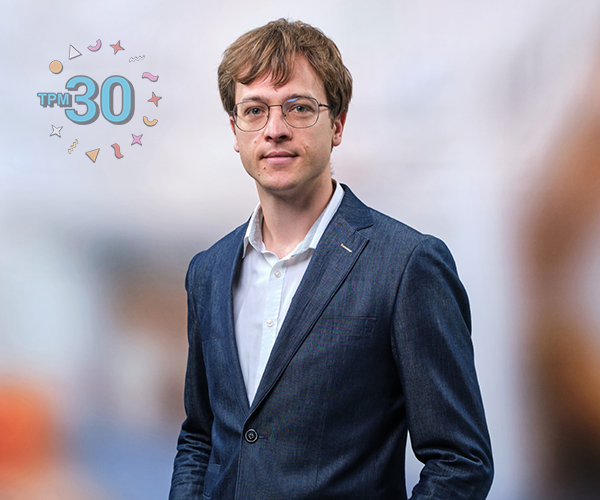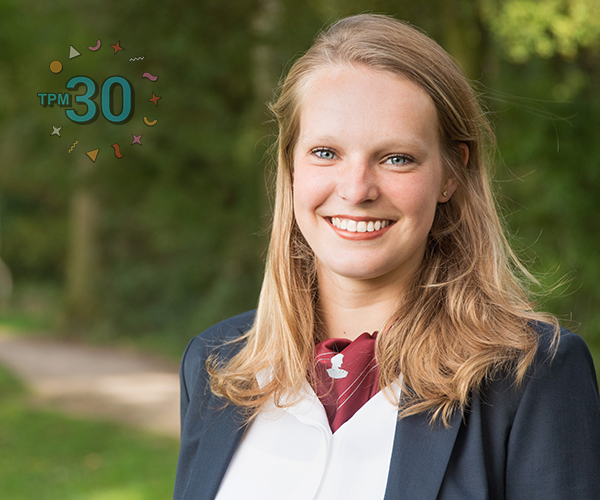TPM Portraits: Sibel Gökbekir
Even as a secondary school student, Sibel Gökbekir already knew she wanted to work in renewable energy. While studying at TPM, she decides to make combating climate change her life's mission. Thanks to her high grades, she was invited to participate in the Honours Programme. As a talent in the field of energy, she hopes to pass on her passion and expertise in renewable energy to future generations.
A degree programme with a STEM side and a social side: that is what Sibel Gökbekir was after when she was contemplating a university degree during her secondary school years. "Maths and Physics were my best subjects, but I also really enjoyed social subjects, such as Economics and Social Sciences. That's why during my pre-university education, I chose the Nature & Technology and Economics & Society profiles."
During an open day at TU Delft, Gökbekir wanted to explore three degree programmes. "The first one was Industrial Design. However, given the emphasis on drawing, I felt it might not suit me. Next, I had a look at TPM, where the focus is on science subjects as well as social science subjects, such as law and governance and micro and market economics. In other words, it was the perfect fit for me. After that, I didn't even visit Applied Mathematics, which was the third programme I had been interested in."
Interest in renewable energy and climate
Although Gökbekir had not yet immersed herself into the TPM domains at the time, her school project made it clear to her which domain appealed to her the most: energy. "I am particularly interested in renewable energy. For my school project, I developed a solar cell of my own, while also explaining, in the theoretical part, why society needs renewable energy. So, it was actually TPM profile paper, with a technical and social component."
During her bachelor degree, Gökbekir realised that the issue of climate and energy was even more urgent than she already thought. "That was when I started reading IPCC reports. I was shocked by the massive impact of climate change. These insights made me consider it my mission to do my part to combat climate change, especially when it comes to the transition to renewable energy."
Participation in the Honours Programme
Because Gökbekir passed her propaedeutic year with flying colours, she was invited to participate in the Honours Programme. "Students get to participate in this programme if they have a grade of 7.5 or higher for their propaedeutic diploma. They can then take a number of courses at their own faculty as well as at other faculties for twenty credits to deepen or broaden their knowledge. Because I was eager to learn more about AI, I decided to broaden my horizon."
Gökbekir works on an AI project regarding the use of social robots in healthcare, among other things. She also attends programmes on leadership and rhetoric. "This was about how to present oneself and convince people. Soft skills, so to say, which are very valuable to a TPM student. When you are dealing with policymakers or corporations, you need to be clear and convincing. In fact, I even gave a TED Talk about the AI project. I ended up getting a 9 for leadership and rhetoric."
Inspired by the AI project from the Honours Programme, Gökbekir decides to do her Bachelor Final Project on the use of social robots in healthcare. "I explored how these robots can contribute to the well-being of the elderly and reduce loneliness. The focus was on the ethical aspect: which tasks are and aren't suitable for robotic support? One of my findings was that even though social robots can nicely complement human caregivers, they cannot replace them. Treating dementia patients was the most controversial aspect."
Choosing the CoSEM Master's degree
Once she had finished her Bachelor's degree, Gökbekir started the Master's programme Complex Systems Engineering and Management (CoSEM) in September 2022. "For me, it was a logical continuation of the Bachelor's. It allowed me to dive deeper into the energy domain while also attending other interesting courses, such as law and government, linear algebra and differential equations. What's more, I also work with many international students. During my Bachelor, everything was done in Dutch, and now I speak English almost exclusively."
According to Gökbekir, many international CoSEM students come from hardcore engineering studies, such as Engineering Physics. "It is very noticeable that they are also really good at technology subjects. I can learn so much from them. At the same time, as a TPM student, my thinking is a little more out-of-the-box and based on systems. If you want to change technology, there also are legal and economic consequences. The combination of different types of expertise is very valuable in collaboration. Lecturers also make it a requirement for many projects that there be at least one non-TPM student and a maximum of two TPM students in a group."
Member of the Education Committee
Gökbekir is a student member of CoSEM's education committee, where she and other students and lecturers look at the quality of education within the Master's programme. "For example: whether all courses are still properly aligned and whether the Master's is also easy to follow for people who do not have a TPM background. You consider the entire Master's from a helicopter view, as it were."
One of the topics that comes up in the education committee is the impact ChatGPT has on education. Gökbekir: "ChatGPT brings risks as well as opportunities. One risk, for instance, is that it can negatively affect academic skills, such as essay writing. But you can also think about ways of putting the tool to good use. It is important that lecturers take these developments into account in their teaching. This is, in fact, already happening in some courses. For example, a lecturer runs an assignment through ChatGPT, after which students have to guess what is wrong with it."
Utilising knowledge for a cleaner world
In addition to her degree programme, Gökbekir also works two days a week at Shell's Renewables department. "You could say I'm a junior consultant. I support Shell customers in going electric with their fleets. As it happens, I just had a course on electrification in my Master's, so I get to apply that knowledge straight away. I also recently attended a training course at Shell on optimisation of the simplex method, a mathematical optimisation technique, something we also did in the Master's. It either solves a linear-optimisation problem in a finite number of steps, or establishes the insolvability of the problem. This method can be used in many (socio) technical systems. So, I already knew a fair bit about that. My supervisor said that with that knowledge I am worth my weight in gold to companies. That was really good to hear."
Gökbekir also hopes to eventually start her career in the business world as an 'energy engineer'. In addition, she wants to inspire young people to get involved in the transition towards sustainable energy, just like she has. "I am affiliated with a network of students who are doing a Master's related to energy, known as de energietalenten (the energy talents). We give guest lectures to secondary school students, for example. It's wonderful to see how, even at a young age, they are very aware of the challenges regarding the climate and energy."
Gökbekir believes that TPM itself should also give the climate and energy issue more prominence in education. "Although there is a focus on certain parts of this, it would be nice if it were embedded in every TPM domain. I think we should do more with the Sustainable Development Goals (SDGs, ed.) anyway. An inspection officer recently highlighted this too. As TPM people, we can play a crucial role in SDG issues. We should take on that role as well."
TPM Portraits
In the "TPM Portraits" series, we speak to TPM members right across the faculty. In celebration of TPM's 30th anniversary we have had personal conversations with people who are ( or have been) all part of the TPM community in their own way. What have they experienced within the faculty? What is TPM to them today? And how do they see the future? A new portrait appears every two weeks.






